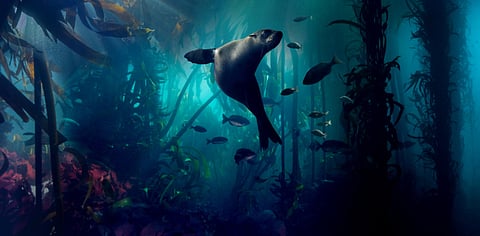What Sir David Attenborough left unsaid in ‘Blue Planet II’
BBC’s showpiece nature programme was calm, hypnotic and awe-inspiring. But it lacked the grave message our situation demands

We find the sea a great source of solace and peace. The author Ronald Blythe has written of the sea’s “most wonderful monotony”, which “can drug the watcher into forgetting past, present and future”. Watching Blue Planet II has been almost as hypnotic, with its sublime rendering of our turquoise oceans, a watery world almost without humans.
This lulling effect is at odds with the message the programme conveyed with new urgency in its final episode: That our oceans, upon which we depend, are under threat like never before.
The BBC Natural History Unit, which makes these incomparable, world-leading works of art and science have come under increasing criticism for not telling the most urgent story of our times: Humanity’s destruction of our planet. Blue Planet II is a riposte. Coral bleaching or plastic pollution, say, was not bundled into one final episode, but scattered throughout the series. Its finale combined breathtaking footage of the most charismatic sea creatures with the most noble broadcaster deploying every fibre of his authority to hit us with overfishing, noise pollution, plastics and other toxins, ocean acidification and sea-level rise.
So as not to swamp us, Sir David Attenborough’s message was that hope, action and individuals can make a difference. This stirring stuff will help us do the easy bits — switch to reusable water bottles and coffee cups, or paper straws — and nudge policymakers towards tougher rules, such as outlawing single-use plastic and creating marine nature reserves (the campaign to protect 30 per cent of the global ocean is admirably ambitious).
Blame the ocean, perhaps, but I was still soothed as much as stirred. Sir David is a saintly man who has done more to save our planet than any living person. But I hoped to be a little more jolted by Blue Planet II’s concluding piece to camera. We needed to hear the following: Sustainable growth is a lie; we must renounce economic growth as a societal goal; we must consume much, much less.
I write this still lacking the courage to unwrap my ludicrously over-packaged food at the supermarket till. But we can’t go on as we are.
Poetry — and motions?
Repairing our dysfunctional relationship with the planet takes many forms. A brilliant crowdfunded campaign launched recently to get copies of The Lost Words into every primary school. And a new book of beautiful paintings by Jackie Morris and dazzling acrostic poems by Robert Macfarlane celebrates 20 everyday species — from acorn to wren — that are disappearing from everyday usage (and children’s dictionaries).
It’s simple, inspirational, and reconnects people of all ages with the joy of our ordinary neighbourhood species. How about the National Trust or the Royal Society for the Protection of Birds, for instance, help get it into every primary school in England, Wales and Northern Ireland? Or, as the author Susan Hill points out, individuals can simply donate a copy or two to local schools. I’ll team up with a bookseller near me and do that in the new year.
Like its predecessor, The Blue Planet (2001), Blue Planet II is narrated and presented by naturalist Sir David Attenborough, while the main music score was composed by Hans Zimmer. The acclaimed documentary is available at BBC One, BBC One HD and BBC Earth channel.
— Guardian News & Media Ltd
Patrick Barkham is a senior Guardian columnist. He frequently writes on natural history.



